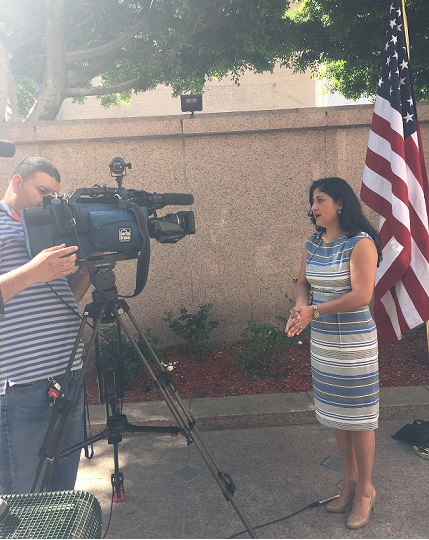When our family joined the education equality lawsuit Vergara v. California four years ago, we knew this case would require commitment and that we would need to be in it for the long haul. Several months ago, we gathered at a Los Angeles courthouse for the latest milestone in the case: to hear oral arguments from our lawyers and those of the State and the teachers’ unions. Sitting in the courtroom, I couldn’t help but think back to the long journey that brought each of us plaintiffs – parents and children – to the courtroom in the first place and the reason why we’re still committed to this case four years later: we are driven by the same need to find justice for our children and to ensure every child in the State of California receives the quality education they deserve, regardless of race or socioeconomic status.
Although I am disappointed by the recent decision of the California Court of Appeals to overturn the 2014 trial court ruling in Vergara, which struck down five quality-blind laws governing teacher tenure, dismissal and seniority-based layoffs in California and directly affecting the educational outcomes of tens of thousands of students across the state, I always knew that there would be three rounds to this fight. I also believe that, in many ways, parents and students have already won.
In just four years, we’ve been able to draw more attention to the need for change in our public education system than policy analysts, academics and reformers have been able to achieve in decades. We – and the parents and students across the state who have stood with us along the way – have created a national discussion around the critical importance of quality teachers for all students. It’s important to remember that the onerous policies challenged by Vergara have existed for decades, but our leadership in Sacramento has lacked the will and perhaps the courage to make the changes students need, despite the strong moral imperative to do so. In addition, and even more importantly, it took a case like Vergara and the movement it engendered for the powerful teachers unions to acknowledge that, as Randi Weingarten, president of the American Federation of Teachers, told the Los Angeles Times, “There are elements of California’s teacher tenure that need fixing.”
Moreover, Vergara has proven to be an effective tool for parents and students to claim their rightful seat at the table in highlighting state policies that fall short of providing our children with the educational support that they need through quality instruction – policies that until recently seemed categorically unyielding. Prior to Vergara, the parent and student voice was often diminished or ignored by school boards and lawmakers when it came to a discussion about students’ educational needs – but no more. Vergara has demonstrated that parent and student voices matter and are key to improving the quality and equality of public education in the state. And our voices have become a chorus calling for the commonsense policies proven by states and districts across the country to effect real and meaningful change.
Now, as we appeal the case to the California Supreme Court, one thing is certain: parents and students will continue to advocate for quality instruction for all children. When the dust settles on Vergara we hope to actively participate in the redesign of these broken policies, so that they work for the benefit of both students and teachers. Just as in a schoolyard, we anxiously wait at the gate for the bell to ring and the doors to open and let us in to partake in our children’s education. We must seize this moment – California parents and legislators – to come together to make the policy changes our children need and protect the future of public education in California.
Evelyn Macias is the mother of Julia Macias, one of nine student plaintiffs behind the education equality lawsuit, Vergara v. California.

